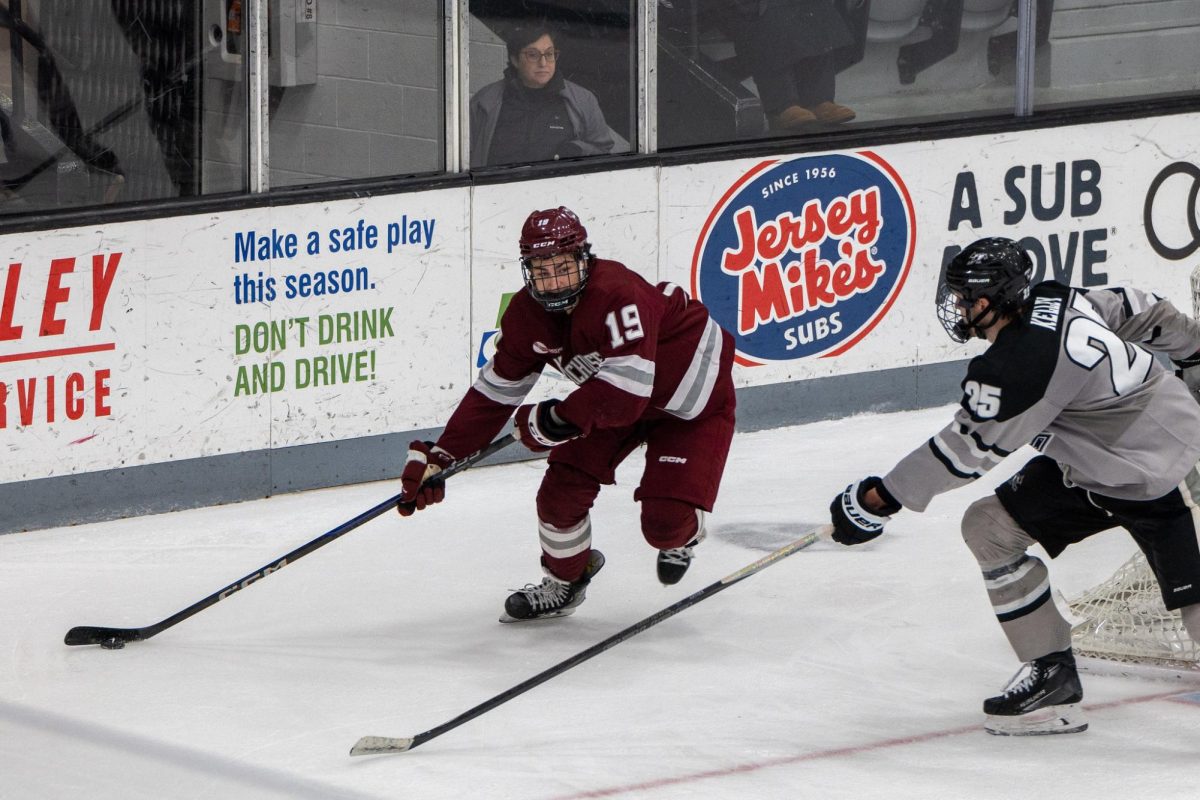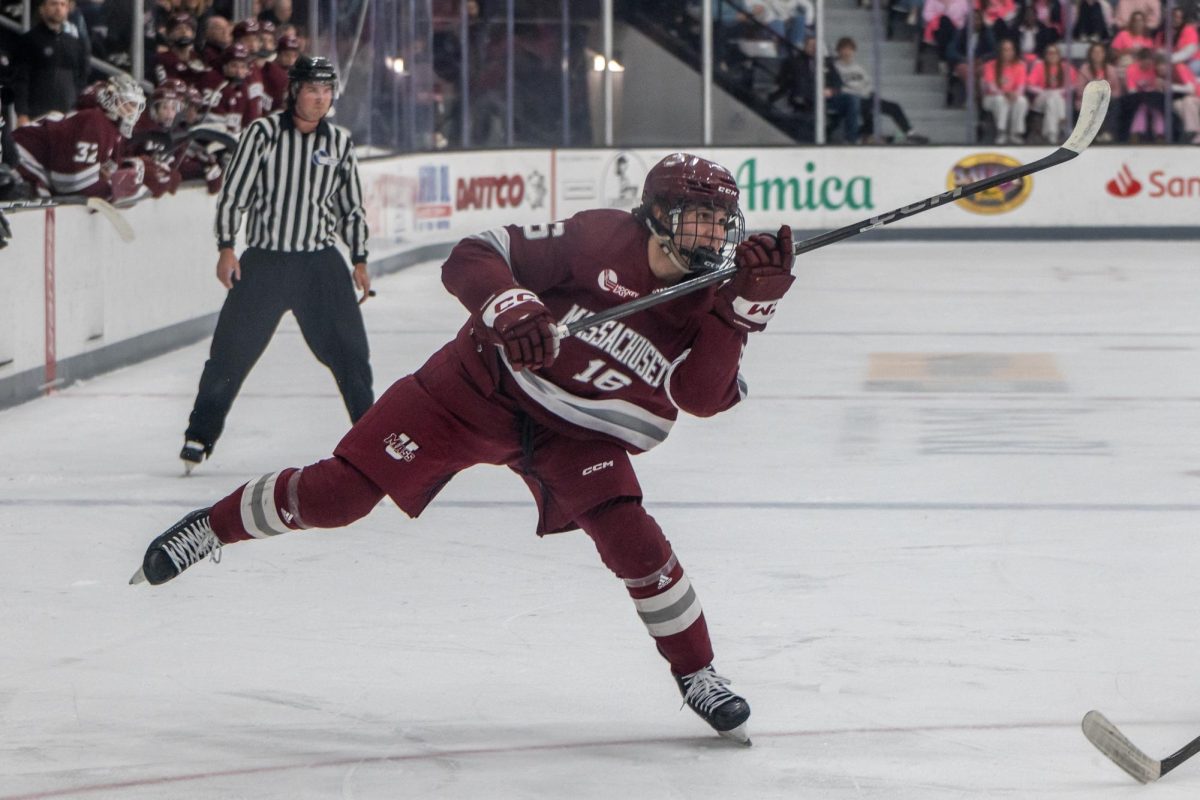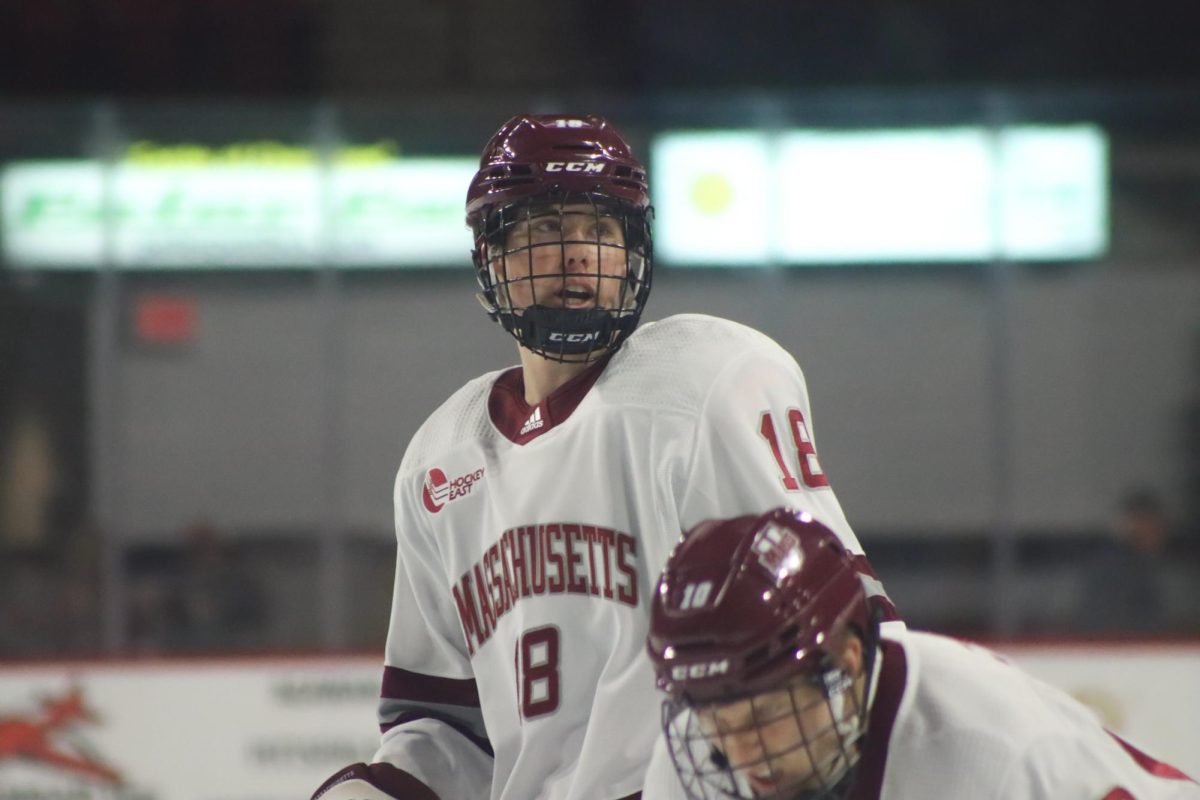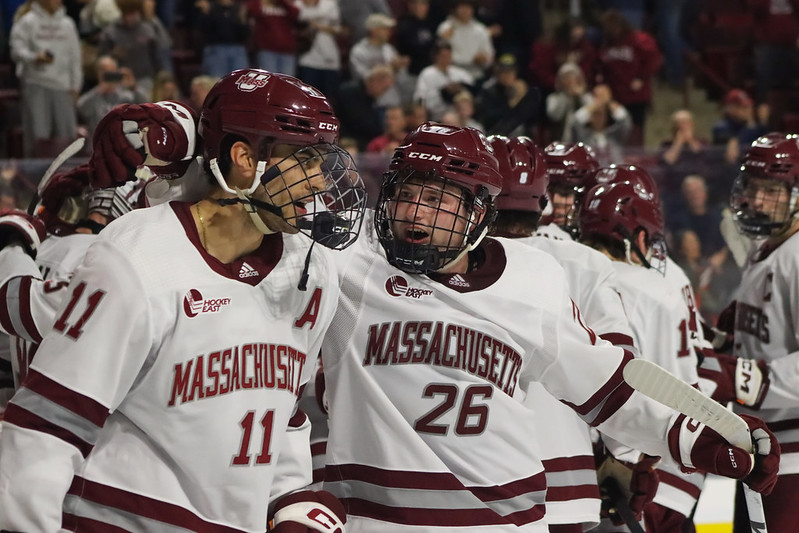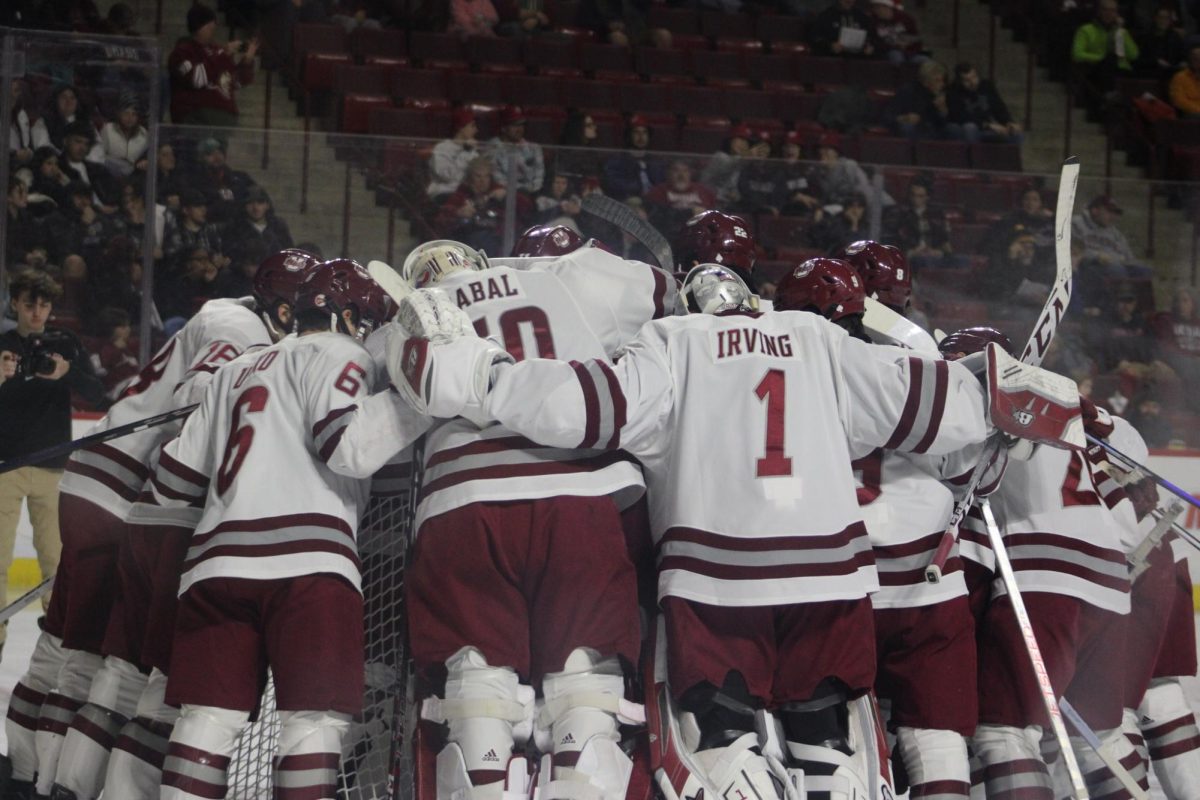
In the last 10 years, Massachusetts’ hockey player Eric Filiou has lived in Canada, Europe and the United States, but the one place he hasn’t lived during that decade is the only place he can truly call home.
When he was 11-years-old, Filiou left his home in Montreal and everything he knew behind to learn English and develop his hockey skills in a setting completely different from what he was accustomed to.
He found himself at Athol Murray College of Notre Dame for high school in Saskatchewan, Canada where everything was new to him. The language, the people and in particular, the lifestyle were all foreign. All Filiou had known was the hustle-and-bustle of Montreal and the immense cityscape. When he arrived in Wilcox, a small village in Saskatchewan, he was greeted with vast farmlands and a population just over 300 people.
“It was a big change,” Filiou said. “To go from all the big buildings [in downtown Montreal] to all the farms and barns and tractors [in Saskatchewan] was almost surreal. But it did me well.”
Being a native of Montreal, Filiou’s first language was French, which is not typically spoken in Canada outside of the major cities in Quebec. Not only did he have to adjust to a life without his parents and friends, but he was forced to do it all without speaking the same language as his peers.
“The language barrier was there for the first couple of years,” Filiou said. “Some way, somehow I ended up being team captain there in my first year, when I could barely speak English. It was extremely hard at points to relate to the guys when I couldn’t talk to them, but I worked through it and we had some great years of hockey.”
Filiou first learned to skate at age four, when his father, Laurent, took him out on the ice in his backyard in Montreal, which freezes over for most of the winter. Laurent taught his son how to glide and move on the ice and when he got older, how to handle a stick.
“[Eric] and his brother came home from daycare one day and told us they wanted to play,” Filiou’s mother Charlyse Roy said. “His father had never really played before, but the kids knew how to skate and wanted to learn. So they went out in the backyard and they played.”
As the years passed and he progressed through youth hockey, Filiou demonstrated an adept understanding of the game and developed a keen sense of proper positioning and in-game strategy. He learned to move around the ice to put himself in better position to score goals, and improved his skating and stick-handling skills with regular training. Growing more passionate about the sport with each passing day, he ultimately decided he wanted to pursue hockey and made up his mind to take his game as far as he could.
“He was always best at skating, but he was a leader among the kids early on too,” Charlyse said. “He spent a lot of time outside, skipping rope, rollerblading, jogging and sprinting. A lot of his time was dedicated to getting better at hockey.”
But the decision came with a price.
“It was hard. Very hard,” Charlyse said. “I was thinking the best for me would be to have [Eric and his brother] stay in Montreal, but the best interest for them was to let them leave. Experiencing life, learning English, which is the business language and [becoming independent] was the best idea for them.”
Hockey was Filiou’s stabilizer amongst a whirlwind of change.
He immersed himself in his favorite game as a way of coping with the stress that surrounded him. He spent countless hours on the ice, skating back-and-forth, working to perfect his craft. Sometimes he joined in pick-up games with neighborhood kids, and what began as a family tradition, quickly developed into not only an escape, but also, a way of life.
“That was a big step,” Filiou said. “I was 11 [years old], couldn’t speak English, living two provinces away from my family. It’s pretty crazy, looking back now, I can’t believe I did it, but I’m really glad I did it.”
Throughout high school in Saskatchewan, Filiou continued to develop his skills, while also maturing into adulthood. When his parents divorced, he was forced to deal with the pain and uncertainty of family life. Already so far from home, he was removed from any direct contact, but the emotional side effects still took a toll on him and forced him to become tougher as an individual.
He began to gradually increase his muscle mass by skating and lifting weights. Filiou played lacrosse for four years as well. Filiou stuck diligently to a workout schedule consisting of conditioning drills and intense running to keep himself in shape for hockey in the winter. He developed a good relationship with his hockey coach, who also coached the lacrosse team, and was able to relate most of his lacrosse drills directly to hockey training.
During Filiou’s off hours, he made sure to keep his parents, particularly his mother, updated on his life. They spoke every day, which helped bridge the geographical gap that separated them.
“I saw the kids every month,” Charlyse said. “Whether we went to a game or they visited Montreal for a weekend. We talked on the phone, emailed and talked over cell phone. He had a calling card too.”
Filiou was also fortunate enough to live next door to Phil Lecavalier, brother of current NHL player, Vincent Lecavalier while in high school. Vincent, who plays for the Tampa Bay Lightning, practiced with his brother and taught him everything he knew when he was growing up. In turn, Phil, who was Filiou’s age, helped him fine-tune his game and grasp some of the more finesse tactics.
When Filiou graduated high school and moved to Vancouver, he lived with a host family on Vancouver Island and played for a team based in the city of Nanaimo. He didn’t know it at the time, but in a game against Port Alberni, he would come face-to-face with another player, Branden Gracel, who would end up being his roommate at UMass in his freshman year.
“Funny enough, we didn’t know each other, but we found out that we played against each other back in Canada, so it’s a good little connection we’ve got there,” Gracel said.
In two seasons playing for the Clippers, Filiou won the British Columbia Hockey League Championship and the BCHL Rookie of the Year while playing with former Minuteman Matt Irwin, who first sold UMass to the young forward. Filiou played one more season in the BCHL the following year in Penticton before taking Irwin’s advice and exploring his opportunity to play hockey in the U.S. Filiou believed he had a better chance of fulfilling his dream of playing in the National Hockey League if he attended an American university.
“I had considered [playing in the U.S.] when I was younger,” Filiou said. “I know we have great hockey back [in Canada] and I love it, but the U.S. hockey scholarship is just so much better than the Canadian one. It’s recognized by a lot of different places if you want to move on and go play pro.”
He went to take the Scholastic Aptitude Test and scouted schools in Hockey East, in what UMass head coach Don Cahoon calls, “the best hockey conference in the country, without a doubt.”
Since French is his first language, he received a boost on the English section of his exam, qualifying him to receive offers from Ivy League schools like Harvard, Yale and Princeton, but none of them attracted his attention.
Instead, Filiou committed to UMass in 2008, and after arriving on campus as a freshman this fall, it exceeded his expectations in just about every way. He also credits his decision to the unique and player-specific coaching style of Cahoon.
“A lot of coaches, when you come down, don’t really care about you as a person,” Filiou said. “One of the things Toot [Cahoon] puts a lot of emphasis on is how good of people his players are. Everyone here is actually a good person and nobody has their own agenda.”
In his first semester on campus, Filiou said he was a little nervous about meeting his teammates and new coaches, but the transition onto the squad has been easy, thanks in part to his experience away from home and the nature of the players on his team.
“He’s a great teammate,” Gracel added. “He’s definitely a guy who’s going to be a leader on this team. He’s a guy who likes to lead by example.”
His first season at UMass has been productive, though not in statistical categories. Filiou has played in eight out of 11 games this season and has taken over majority of faceoff duties when he is on the ice. He has only netted one goal, but Cahoon praises his work ethic, maturity and natural ability, saying that, with some experience, the game will become even more instinctual for him.
“I think the best part of his game is that he’s pretty trustworthy,” Cahoon said. “[As far as getting in position], he’s pretty sound. He doesn’t make a lot of mistakes with where he is on the ice and supporting his players.”
Being a native of Montreal, Filiou grew up idolizing the Canadians and said his ultimate goal is to be drafted and play for them. Part of his workout regimen at UMass is designed to prepare him for professional play and he is dedicated to improving on a day-to-day basis.
“I really want to go pro,” Filiou said. “I want to get better everyday. I was a little bit better offensively when I was playing in Vancouver, and it’s something I’m working on here.”
Filiou may have lacked a typical family environment growing up, but in the mean time, he’s found a new family and a sense of belonging in Amherst and is focused on enjoying life as a Minuteman
“So far, it’s been a really great time,” Filiou said. “I love everybody I’ve met here and I’m really happy I picked UMass over everywhere else.”
Mike Wood can be reached at [email protected].


